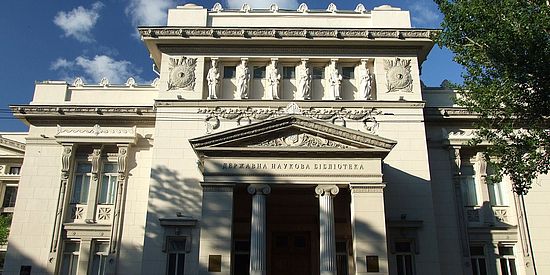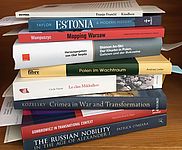
Slavic Studies | East European Studies
Subject librarian
Highlights
Slavic Studies | East European Studies
New acquisitions in the previous month
Subject-specific training courses
As part of the undergraduate seminars for students of Slavic and East European Studies, regular library introduction sessions take place (library catalogue, holdings and subject information as well as electronic information and media available). The dates will be announced here in good time.
All training opportunities
An overview of all training opportunities at the University Library – introductory sessions at the start of the semester, training courses, guided tours, reference management, etc. - can be found here
Specialist institutions for Slavic and East European Studies
- Courses in East European Studies at the University of Basel (in German)
- Department of Slavic Studies Basel (in German)
- Department of History, East European History (in German)
- Osteuropa-Forum Basel (OFB) (in German)
- URIS – Network of Ukrainian Research in Switzerland
- CLARIN-CH digital language resources (corpora etc.)
- Swiss Library of Eastern Europe SOB
- SAGO – Schweizerische Akademische Gesellschaft für Osteuropawissenschaften (in German)
- Bayerische Staatsbibliothek – Eastern Europe collection
- Staatsbibliothek zu Berlin – Eastern Europe Department
- Russian and East European Library Collections
Subject-specific links
- Corpora for Slavic Languages
- Digital Libraries with materials on Central, Eastern and Southeastern Europe
- Verbundkatalog Östliches Europa (in German)
- Digitales Forum Mittel- und Osteuropa (in German)
- OstDok- Osteuropa-Dokumente online (in German)
- Bibliography portal for the history of East Central Europe
- GeoPortOst – Thematic and Hidden Maps of Eastern and Southeastern Europe
- Postkarten aus dem Russländischen Reich (Sammlung Familie Radzievsky)
- Visual Archive Southeastern Europe
- Documentary Photographs of Early Soviet Russia
- Images of Russia and Caucasus Region 1929-1933
University Library holdings
- Reference works
- Academic subject-related literature, textbooks
- History, society, philosophy, religion, regional studies about East, East Central and South-Eastern Europe and the Balkans (predominately in Western languages)
- General works and monographs (predominately in Western languages)
- Complete editions
- Fiction translated from Slavic, Baltic and Finno-Ugric languages
- Travel literature
- Journals and series
- Licences for electronic media (e-books, e-journals, databases) in the university’s computer network
Libraries with additional holdings
Library of the Department of Slavic Studies
The focus is on - predominantly original language - works on language, literature, film, theatre and culture. Regionally, the collection concentrates primarily on BCMS, Polish, Russian, Czech and Ukrainian.- Library of the Department of History
This library has a large collection on East European history.
Basel theologian Fritz Lieb (1892-1970) was a specialist in the Orthodox Church and Russian intellectual history - a Slavist, orientalist, philosopher, geologist, archaeologist and collector of advant-garde art, a dedicated journalist and politician. He donated his Russian-Slavic library to the University Library Basel at the end of 1951. His wife, Ruth Lieb-Stähelin (1900-1986), continued to expand the library after his death.
The Lieb Library comprises around 13 000 monographs, periodicals and manuscripts about Slavic, especially Russian, intellectual, church, literary, social, economic and religious history. The oldest prints date back to the 17th century, the most recent titles from the 1980s. All the titles are documented in our search portal swisscovery.
Included in Fritz Lieb’s bequest are biographical sources about his life and work as well as political, theological and East European contemporary documents. The bequest is electronically indexed in swisscollections.

Russian-Swiss Elsa Mahler (born in Moscow in 1882 and died in Riehen, Basel in 1970), was the first female professor at the University of Basel.
After her studies in St. Petersburg, Berlin and Munich as well as working i.a. in schools in Petrograd and at the Russian Academy of Sciences, Elsa Mahler moved to Basel in 1920 where she laid the foundations of the Department of Slavic Studies and its library. She qualified as a professor in 1928 with her work about Russian laments for the dead and worked for a further ten years as an outside lecturer. In 1938 she became the first woman to be appointed associate professor at the University of Basel.
In 2011, the University Library Basel presented an exhibition entitled "Elsa Mahler – Die erste Professorin der Universität Basel und ihre slavistisch-volkskundlichen Sammlungen", curated by the Profile Area Eastern Europe, which had also curated an Elsa Mahler exhibition in 2010 as part of the university’s 550th anniversary.
The Elsa Mahler bequest is kept in the University Library Basel and is electronically indexed in swisscollections. Amongst other things, it contains correspondence, texts and sheet music, original sound recordings of Russian folk songs, as well as material on Old Russian folk songs and photographs from the Pečory region. The sound recordings from Elisa Mahler’s bequest can be heard in digital format through Memobase.
Detailed information about the biography and works of Elsa Mahler can be found on the website on the history of the Department of Slavic Studies and on the website of the online project on the history of the University of Basel.

Elsa Mahler in her study (circa 1962)

